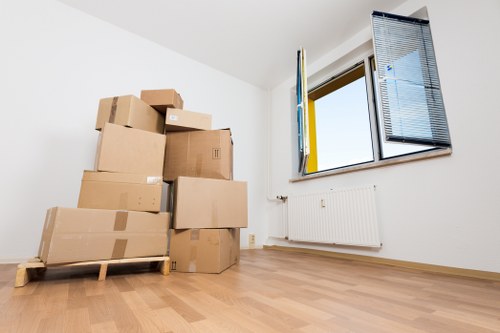Comprehensive Guide to Council Rubbish Collection in Gerrards Cross

Managing household waste is a crucial aspect of maintaining a clean and healthy environment. In Gerrards Cross, the council rubbish collection service plays a pivotal role in ensuring that residents can dispose of their waste efficiently and responsibly. This article delves into the various aspects of rubbish collection in Gerrards Cross, providing valuable information for residents and visitors alike.
Understanding the rubbish collection schedule, types of waste accepted, and guidelines for sorting recyclables can help streamline the disposal process. Additionally, knowing the penalties for non-compliance and available resources for waste reduction can contribute to a more sustainable community.
Whether you’re a long-time resident or new to the area, this guide will equip you with the knowledge needed to navigate the council rubbish collection services effectively.
Rubbish Collection Schedule

The Gerrards Cross council operates a structured rubbish collection schedule to ensure timely and organized waste removal. Typically, the service runs weekly, with specific days designated for different types of waste.
General Waste: Collected on Mondays. Residents are expected to place their bins out the night before. Ensure that the lids are securely closed to prevent animals from scattering the contents.
Recycling: Collection occurs on Wednesdays. Items such as paper, cardboard, glass bottles, and cans should be sorted and placed in the designated recycling bins.
Types of Waste Accepted

The council provides clear guidelines on the types of waste that can be collected. Adhering to these guidelines helps maintain the efficiency of the rubbish collection system and supports environmental sustainability.
Accepted Waste:
- General household waste
- Recyclable materials (paper, plastics, glass, and metals)
- Garden waste
- Bulky items (with prior arrangement)
Non-Accepted Waste:
- Hazardous materials (chemicals, paints, batteries)
- Electrical appliances (unless scheduled for special collection)
- Medical waste
- Construction debris
Sorting Your Waste

Properly sorting your waste is essential for effective recycling and waste management. The council provides detailed instructions on how to separate different types of waste.
Recyclables: Ensure that all recyclable items are clean and dry before placing them in the recycling bin. Remove any food residues from containers to prevent contamination.
General Waste: Non-recyclable items should be disposed of in the general waste bin. Avoid mixing recyclables with general waste to facilitate efficient processing.
Bulky Waste Collection

For items that are too large for standard bins, such as furniture or large appliances, the council offers a bulky waste collection service. Residents must book a collection slot in advance, usually providing details about the items to be collected.
It’s important to schedule bulky waste collection outside of regular rubbish collection days to avoid confusion and ensure that the items are removed promptly.
The council may charge a fee for bulky waste collection, depending on the size and type of items. Checking the latest council guidelines can provide clarity on any associated costs.
Recycling Initiatives in Gerrards Cross
Recycling is a cornerstone of Gerrards Cross' waste management strategy. The council promotes various initiatives aimed at increasing recycling rates and reducing landfill waste.
Recycling Centers: The council operates designated recycling centers where residents can drop off items that are not collected during regular rubbish collection, such as electronics and hazardous materials.
Educational Programs: Community workshops and educational programs are regularly held to inform residents about the importance of recycling and how to effectively sort waste.
Special Collections and Seasonal Services
During certain times of the year, the council may offer special collection services to address specific needs.
Garden Waste: In the spring and autumn, garden waste such as leaves, branches, and grass clippings are collected separately to maintain public green spaces.
Bulk Item Drives: Before the holiday season, the council may schedule extra collections to handle the increased volume of waste generated by decorations and seasonal items.
Penalties for Non-Compliance
Adhering to the council's rubbish collection guidelines is not only beneficial for the community but also a legal requirement. Failure to comply can result in penalties.
Fines: Residents who do not comply with waste disposal regulations may be subject to fines. These can vary based on the severity and frequency of the violations.
Enforcement Actions: Persistent non-compliance may lead to enforcement actions, including court proceedings or increased surveillance by waste management authorities.
Tips for Reducing Household Waste
Reducing the amount of waste your household generates is an effective way to contribute to a cleaner environment and ease the burden on rubbish collection services.
Minimize Single-Use Items: Opt for reusable products instead of single-use plastics. This not only reduces waste but also promotes sustainable living.
Compost Organic Waste: Composting kitchen scraps and garden waste can significantly decrease the volume of rubbish you need to dispose of.
Local Regulations and Guidelines
Gerrards Cross has specific regulations and guidelines that residents must follow regarding rubbish collection. Familiarizing yourself with these rules ensures smooth waste management and avoids potential fines.
Bin Placement: Bins should be placed at the curb by 7 AM on collection days and removed the following day to prevent obstruction and pests.
Bin Sizes: Ensure that you have the correct bin sizes for your needs. The council provides various bin sizes based on household requirements.
Accessible Waste Collection Services
The council is committed to providing accessible rubbish collection services for all residents, including those with disabilities and the elderly.
Special Arrangements: Residents who require assistance with waste disposal can contact the council to arrange for curbside collection or other support services.
Communication: The council offers multiple channels for residents to request assistance, ensuring that everyone has access to necessary waste management services.
Impact on the Environment
Effective rubbish collection and waste management have a significant impact on the local environment. Proper disposal reduces pollution, conserves resources, and promotes public health.
Pollution Reduction: By ensuring that waste is correctly disposed of, the council minimizes the risk of pollution in local waterways and green spaces.
Resource Conservation: Recycling and waste reduction initiatives help conserve natural resources, supporting sustainable community growth.
Technology in Waste Management
Advancements in technology have enhanced the efficiency and effectiveness of rubbish collection services in Gerrards Cross.
Smart Bins: The introduction of smart bins equipped with sensors allows the council to monitor waste levels in real-time, optimizing collection routes and reducing unnecessary collections.
Data Analytics: Analyzing waste collection data helps the council identify trends, forecast waste generation, and implement targeted waste reduction strategies.
Community Involvement
Community participation is essential for the success of the council rubbish collection program. Engaging residents in waste management initiatives fosters a sense of responsibility and collective effort toward a cleaner environment.
Volunteer Programs: The council organizes volunteer events focused on waste reduction, recycling, and community clean-up projects.
Feedback Mechanisms: Residents are encouraged to provide feedback on rubbish collection services, enabling the council to make informed improvements.
Recycling Education and Resources
Educating residents about the importance of recycling and providing the necessary resources are key components of Gerrards Cross' waste management strategy.
Informational Campaigns: The council runs campaigns to inform residents about proper recycling practices and the benefits of waste reduction.
Resource Distribution: Providing bins, guides, and other resources helps residents comply with waste management guidelines effectively.
Future Plans for Waste Management
The council is continually looking to improve rubbish collection services and overall waste management in Gerrards Cross. Future plans may include expanding recycling programs, incorporating more advanced technologies, and enhancing community engagement efforts.
Expansion of Recycling Facilities: Plans to increase the capacity and services of recycling centers to handle more types of recyclable materials.
Introduction of Composting Programs: Encouraging households to compost organic waste, thereby reducing the amount of waste sent to landfills.
Cost of Rubbish Collection
Understanding the costs associated with rubbish collection is important for residents to manage their household budgets effectively.
Standard Fees: The council charges a standard fee for rubbish collection services, which covers the regular disposal and maintenance of waste management infrastructure.
Additional Services: Fees may apply for additional services such as bulky waste collection or extra recycling pickups.
How to Report Issues with Rubbish Collection
If you encounter problems with rubbish collection, such as missed pickups or overflowing bins, it’s important to report them promptly to the council.
Online Reporting: The council’s website offers an online form to report rubbish collection issues, making it convenient for residents to seek assistance.
Customer Service: Residents can contact the council’s customer service team via phone or email to report and resolve rubbish collection problems.
10-15 Closest Areas to Gerrards Cross
Gerrards Cross is surrounded by several nearby areas, each with unique features and their own rubbish collection services managed by the council.
- Chalfont St. Giles: Located just 2 miles from Gerrards Cross, Chalfont St. Giles benefits from regular rubbish collection and shared recycling initiatives.
- Chalfont St. Peter: 3 miles away, this area has its own waste management schedule aligned with Gerrards Cross for seamless service.
- Aldbury: Situated 4 miles from Gerrards Cross, Aldbury residents enjoy efficient rubbish collection with options for additional bulky waste services.
- Amersham: 5 miles distant, Amersham follows similar recycling guidelines, ensuring consistency across nearby communities.
- Great Missenden: At 6 miles away, Great Missenden collaborates with Gerrards Cross for joint recycling programs and community clean-ups.
- Little Chalfont: Just 2 miles from Gerrards Cross, Little Chalfont residents have access to the same rubbish collection resources and schedules.
- Chalfont Common: Located 3 miles from Gerrards Cross, Chalfont Common shares recycling facilities and participates in regional waste reduction initiatives.
- Princes Risborough: 7 miles away, Princes Risborough aligns its waste management practices with those of Gerrards Cross for efficient service delivery.
- West Wycombe: Situated 8 miles from Gerrards Cross, West Wycombe benefits from the council’s comprehensive rubbish collection services.
- Great Missenden: Positioned 6 miles away, this area participates in the council’s recycling and waste management programs.
- Long Crendon: At 9 miles distant, Long Crendon enjoys reliable rubbish collection services coordinated with neighboring areas.
- Chinnor: 10 miles from Gerrards Cross, Chinnor residents have access to bulk waste collection and recycling services.
- Denham: Just 5 miles away, Denham shares similar waste management practices, ensuring consistent rubbish collection services.
- Taplow: Located 6 miles from Gerrards Cross, Taplow benefits from the council’s efficient waste disposal and recycling programs.
- Marlow: 7 miles distant, Marlow aligns its rubbish collection schedules with Gerrards Cross for coordinated service delivery.
Conclusion
Council rubbish collection in Gerrards Cross is a well-organized service that plays a vital role in maintaining the town’s cleanliness and sustainability. By understanding the schedules, guidelines, and available resources, residents can effectively manage their waste and contribute to a greener environment.
Active participation in recycling initiatives and adherence to waste disposal regulations not only benefits the community but also supports broader environmental goals. As technology and community involvement continue to evolve, Gerrards Cross remains committed to improving its rubbish collection services for the well-being of all its residents.
Frequently Asked Questions
1. How can I find out my rubbish collection day in Gerrards Cross?
Your rubbish collection day can be found on the council’s website by entering your postcode or by checking the seasonal schedule provided by the council.
2. What items are considered bulky waste and require special collection?
Bulky waste includes large items such as furniture, appliances, and significant garden equipment. These items typically require booking a special collection service.
3. How do I prepare my recycling for collection?
Ensure that all recyclables are clean and dry, sort them according to the council’s guidelines, and place them in the designated recycling bin on the collection day.
4. Are there any charges for regular rubbish collection in Gerrards Cross?
Regular rubbish collection is generally included in your council tax, but additional services like bulky waste collection may incur extra charges. Check the council’s fee schedule for detailed information.
5. What should I do if my rubbish bin is lost or stolen?
If your rubbish bin is lost or stolen, contact the council immediately to request a replacement. There may be a fee associated with replacing lost or stolen bins.